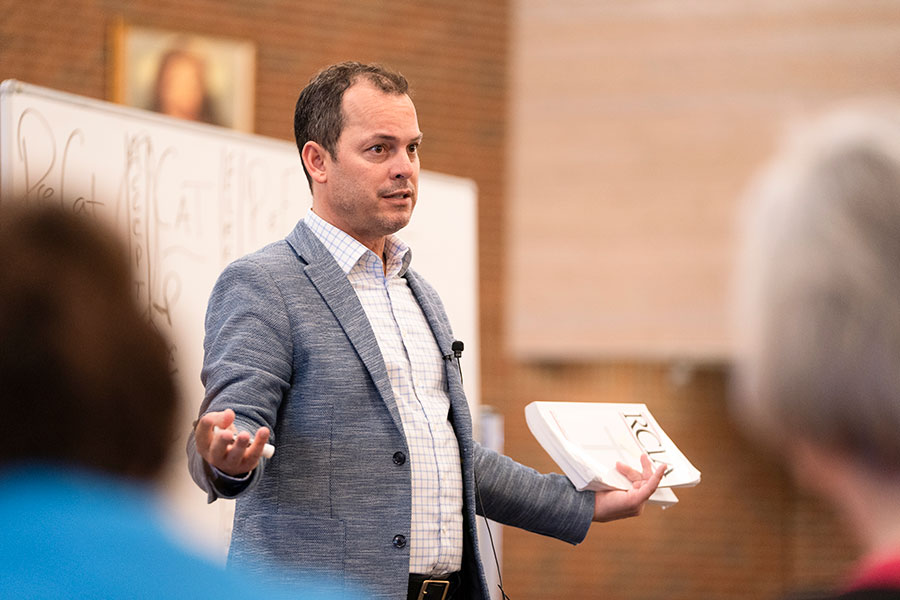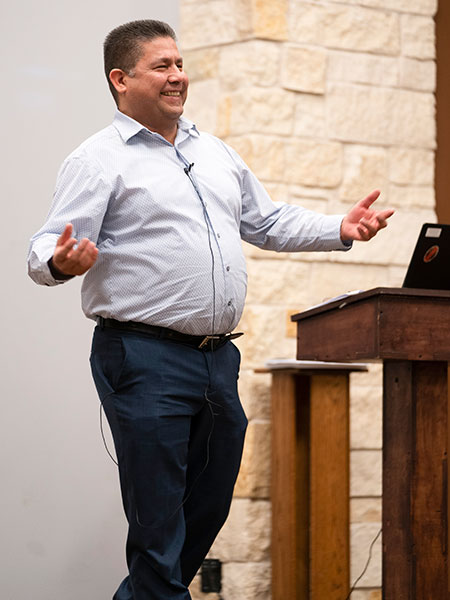Liturgical aspect highlighted during annual RCIA Formation Day

Dr. Scott Sollom gives a presentation during Diocesan RCIA Formation Day February 11 at St. Michael Parish. (NTC/Jayme Donahue)
BEDFORD — The training and formation of those teaching RCIA and RCIA for Children entails multiple aspects, said Jason Whitehead, diocesan director of Evangelization and Catechesis.
“Today is specifically about the liturgical aspect of RCIA,” Whitehead said. “We focus on a specific topic each year. The last few years we’ve concentrated on a specific period of RCIA or specific aspect. “Today, we’re focusing on the liturgical — specifically for the purpose of concentrating on the reason for it, which is the communication of grace.”
RCIA instructors and directors from parishes throughout the diocese gathered Feb. 11 at St. Michael Church in Bedford for the event, which included talks and workshops in English and Spanish.
“Since these are all volunteer catechists, we hold the event on Saturday each year to help accommodate their schedules,” Whitehead said.
The annual event stresses not only the need for initial but also continuing formation, Whitehead said.
Whitehead asked attendees to strive for two main takeaways, the first being the imparting of grace via the liturgical aspects of RCIA.
“The reason it’s called the Rite of Christian Initiation for Adults is because these rites, both major and minor, actually do communicate grace,” Whitehead said. “I want you to understand that because when you’re back at your parishes making your RCIA schedule and wondering what you should make more time for, I would like today to stand out in your memory and maybe squeeze in a few more liturgical rites. Why? Because your catechumens and candidates need more grace from their RCIA journey so they can live a more fruitful Catholic life.”
Whitehead stressed the preeminence of charity and the importance of accompanying as well.
“RCIA is a premiere, primary model and method wherein the Church bears the burdens of those seeking to come to her,” Whitehead said. “Specifically, you are there to bear their burdens. Accompaniment is about bearing your brother’s and sister’s burden and walking that journey with them. Through the liturgy the Church grants grace to those who come knocking on the parish door.”
Dr. Scott Sollom, a Franciscan University theology professor, echoed those sentiments during his keynote speech.

“People need to be encouraged through the liturgy and the grace that’s received through the liturgy,” Sollom said.
Sollom offered the example of a candidate whose life swerved into a tailspin after starting strong in his RCIA journey. Encouragement to stick with it brought the man through his journey and spiritually stronger for it.
“The liturgical rites propel and sustain the process of conversion,” Sollom said.
Sollom characterized the RCIA journey as a slow process of stages informed catechetically, applied pastorally, and graced liturgically at every stage, as well as the reconfiguration those going through the process experience from the first rite forward.
Sollom warned teachers and directors against holding low expectations of catechumens.
“They’ve received enough grace that they should be changing in nature and growing in Christ,” Sollom said. “They’re already meant to be living out this grace.”
Patrick Norton of Carrollton’s St. Catherine of Siena Church voiced appreciation for the day’s 30,000-foot view of the importance of RCIA’s framework and the important reminder that RCIA formation is far from a process of simply checking off boxes.
Father Vijaya Mareedu, SAC, pastor of St. Michael, highlighted RCIA’s connection to evangelization.
“You have encountered God in your lives, and you want to give that to others,” Fr. Mareedu told attendees. “May the spirit of God inspire you all so that you may become a channel of grace for your candidates and your parishes.”
